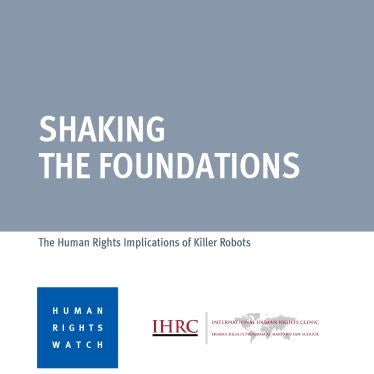(Maputo) – The Obama administration has made a commitment to take several steps that may ultimately allow the United States to accede to the Mine Ban Treaty, Human Rights Watch said today. The US Ambassador to Mozambique made the announcement on June 27, 2014 at the Mine Ban Treaty’s Third Review Conference in Maputo, which the US is attending as an observer.
The US said it is “diligently pursuing … solutions that would be compliant” with the Mine Ban Treaty and “that would ultimately allow us to accede” to it.
“The US has finally come out of the shadows in indicating it intends to join the landmine treaty, and let’s hope it will move ahead rapidly to come on board,” said Steve Goose, arms director at Human Rights Watch, and chair of the United States Campaign to Ban Landmines, a coalition of more than 400 nongovernmental organizations. “This is an important acknowledgement that the treaty provides the best framework for achieving a world free of deadly antipersonnel mines.”
US officials indicated that the statement delivered at the landmine conference does not represent the final outcome of the landmine policy review initiated by the Obama administration in 2009, but is an interim announcement as “other aspects” of the landmine policy “remain under consideration.” The US Department of Defense has been tasked with conducting a detailed study into alternatives to self-destructing antipersonnel mines – which are prohibited by the treaty – and the impact of pledging to make no further use of the weapon.
The announcement does not preclude the US from using self-destructing antipersonnel mines anywhere in the world as has been US policy since January 1, 2011.
The US stockpile is believed to consist of approximately 9 million self-destruct antipersonnel mines.
According to the statement, in the future the US “will not produce or otherwise acquire” antipersonnel mines “that are not compliant” with the Mine Ban Treaty and will not replace those mines “as they expire in the coming years.” An official indicated that the US would not extend the shelf life of existing systems, by replacing their batteries for example.
A total of 161 nations have signed the 1997 Mine Ban Treaty, which comprehensively bans antipersonnel landmines and requires their clearance and assistance to victims. The Clinton administration in 1997 set the objective of joining the treaty in 2006, but the Bush administration reversed course in 2004.
Human Rights Watch is a founding member of the International Campaign to Ban Landmines, which received the 1997 Nobel Peace Prize, together with its coordinator, Jody Williams, for its efforts to bring about the Mine Ban Treaty and for its contributions to a new international diplomacy based on humanitarian imperatives.
“It makes no sense for the US to acknowledge the weapons should be banned because of the humanitarian harm they cause while retaining the option to use them for years to come,” Goose said. “The US should set a target date for joining the Mine Ban Treaty, should commit to no use of the weapons until it accedes, and should begin destruction of all its stockpiles.”






